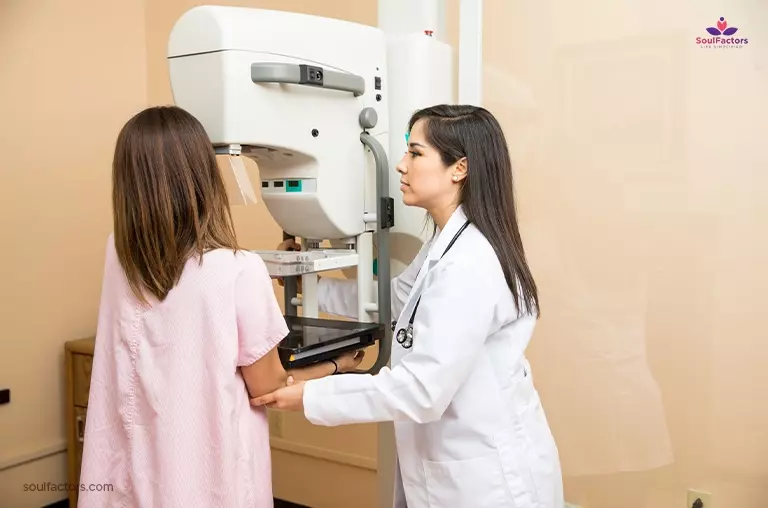Women Perceive Breast Density Not A Risk Factor For Breast Cancer
Breast cancer is common among women and one must be aware of the risk factors related to it. But women have underestimated a major risk factor.
On Jan 24, 2023 – 4 minutes read

A study named Perceptions Of Breast Cancer Risks Among Women Receiving Mammograph Screening is published in JAMA Network Open(1). The study focused what were the thoughts of women that contributed to risk factors for breast cancer. This Study showed that women misjudged breast density as a major risk factor for breast cancer.
Participants of 1858 women from ages 40 to 76 years from 2019 to 2020 who had undergone mammography were surveyed for the study. They had no history of breast cancer and were aware of the term ‘breast density’. In reality, dense breast tissue is a major risk factor that contributes to breast cancer. It has been shown that breast cancer is four times more likely to occur in women with dense breast tissue.
Study On Comparison Between Risk Factors Of Breast Cancer
In the study, women were asked to rate the risk factors of breast cancer. Along with breast density, being overweight or obese, drinking more than one alcoholic beverage per day, never having children, and having a prior breast biopsy were the other risk factors.

One of the authors of the study Laura Beidler said that among other risk factors taken into consideration, women did not think about breast density to be a significant risk factor for breast cancer. About 93% of women thought that breast density was not a serious risk.
The authors interviewed 61 participants with high breast density about what could be the reasons for breast cancer in their understanding. They said that breast density could hide tumors on mammograms but it was found that very few women felt that breast density could be a reason for breast cancer.
Women were asked about what could be done to reduce such risk factors. For that, 33% of women thought that there were no possible ways to reduce the risks associated with breast cancer.
Dense Breast Tissue
Breast tissue is composed of milk glands, ducts, supportive tissue, and fatty tissue. In terms of breast tissue, dense breasts are those with a greater percentage of glandular and fibrous tissue than fat tissue. Approximately half of the women undergoing mammograms will encounter this finding. It’s normal and a common finding. A radiologist analyses whether someone has dense breast tissue or not. The ratio of dense breast tissue with non-dense tissue determines the degree of breast density. There are no valid reasons why some women have high breast density. But one might have dense breast tissue if they are younger, with a lower body mass index, pregnant /breastfeeding, or is under hormone replacement therapy.
Doctors suggested that the risk of breast cancer is directly proportional to the level of breast density i.e higher breast density could increase your risk for breast cancer. But they aren’t certain about the reason behind this finding.
Dr. Harold Burstein, a breast oncologist at the Dana-Farber Cancer Institute who was not part of the study suggested that the reason could be the high levels of estrogen that aids in dense breast tissue and thereby breast cancer. 38 states across the country have now made it compulsory that women be notified about their breast density and the potential risk of breast cancer.
Dr. Ruth Oratz, a breast oncologist at NYU Langone’s Perlmutter Cancer Center, not part of the study commented that even though women receive written notification regarding their breast density, it was written at the bottom of the report. She isn’t sure whether anyone is taking a hand to explain the seriousness or to create awareness regarding the issue. She added to her comment that primary healthcare providers must be aware of this issue to educate the women.
A woman with an average risk of breast cancer should have breast cancer screening every one to two years between the ages of 50 and 74, with a possibility of starting screening at age 40.
The authors of the study suggest that women with dense breast tissue must complement their mammogram with additional screening like MRI or an Ultrasound. Such additional screenings can determine cancerous cells that are missed on mammograms. Presently, supplementary screening after the initial mammogram depends upon insurance and state policy.
Authors also warn that these supplementary screenings can increase the number of false positive results and high rates of a breast cancer diagnosis. Hence, healthcare professionals must be careful while discussing to associate with supplementary tradeoffs.
This decision regarding supplementary screening is a mutual one between the patient, the clinical team, and the radiologist. Family history will also be considered. Since women have different levels of breast cancer risk, we cannot make one general recommendation for the entire population.
Reduce Breast Cancer Risk Factors
As mentioned above, women thought that there is absolutely nothing to do to prevent breast cancer and its potential risk factors. But experts said that there are ways to reduce risk factors associated with breast cancer. Keeping a healthy lifestyle and minimizing alcohol consumption address several modifiable factors. Breastfeeding can lower the risk. Hormone replacement therapy increases the risk of breast cancer.
Moreover, approved medications such as tamoxifen may reduce the chances of breast cancer by about half for those at significantly increased risk. Also, knowing your risk factors and advocating for yourself can be powerful tools in preventing and detecting breast cancer.

Subscribe to Newsletter
Elevate your routine, stay on trend, and embrace a personalized beauty journey with our curated insights.





Write a Comment